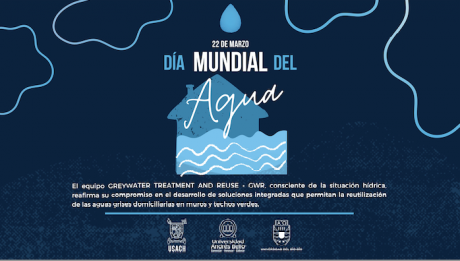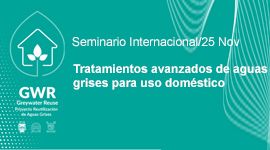You are here
World Water Day Commemoration

Undoubtedly, Chile is going through a difficult situation in terms of water and access to drinking water due to the most severe drought in its history. According to the Climate and Resilience Research Center (CR2), the mega-drought will last for 13 years until 2021, making it the fifth driest year in 100 years.
Last summer, record temperatures were recorded in Chillán (41.5°C), Los Angeles (42.2°C) and Santiago (37°C), with heat waves that lasted for days, exacerbating the drought because they were accompanied by long periods without rainfall. In recent years, we have also witnessed rainfall deficits in areas in the extreme south of the country, a drop in the water levels of reservoirs in the central north (Los Aromos, Valparaíso and Puclaro reservoirs, Coquimbo region, among others), and the retreat of the main glaciers in the central part of the country, a source of drinking water, especially for the capital, in recent years.
On the other hand, there are areas of the country that already have serious problems of access to drinking water and face serious problems of access to water for irrigation, such as the area of San Pedro de Melipilla in the Metropolitan Region and the area of Petorca in the Valparaíso Region, where there are daily drinking water cuts and delivery of drinking water through water trucks.
For this reason, it is important to start a water planning process that will allow us to put engineering at the service of generating solutions, education and public policies, and that will allow us to face a future that, according to projections, will be increasingly drier, with a decrease in precipitation of up to 40% by 2050. A great step has been taken with the establishment of a diagnosis for the development of a National Water Plan, but more decisive action is needed.
First of all, it is important to raise awareness among the population about the use and conservation of water at the domestic level, such as education on garden irrigation, the use of species that consume little water, as well as the development and implementation of accessible technologies for the reuse of domestic gray water, etc. It is also important to encourage and promote solutions to the problem of water scarcity. It is important to encourage and promote solutions to reduce water consumption in agriculture and access to efficient irrigation technology, whose national water consumption reaches 73%, through subsidies to small and medium farmers and finally to think about water desalination as a real alternative to provide water to localities that no longer have access to water with efficient and responsible use. Another important public policy to be implemented is the incorporation of management parameters for the responsible use of water in agricultural, industrial, educational and domestic activities, such as life cycle and water footprint analysis, in order to have a more sustainable use of this vital resource.
According to a study conducted by the World Resources Institute (Hofste et al., 2019), 17 countries are found to have extremely high levels of water stress, most of them belonging to the Middle East and North Africa. Immediately after, in the 18th position of this ranking, Chile appears as the first country with high levels of water stress, being the only Latin American country that will move to an extremely high level of water stress in 2024 (EH2030, 2019)
Our team "Greywater Treatment and Reuse - GWR" funded by Proyecto Anillo - ANID ATE220224, integrated by the University of Santiago de Chile, together with the University of Bío-Bío and Universidad Andrés Bello, is working on the development of electrochemical solutions, through the use of membranes that will allow the reuse of domestic greywater in walls and green roofs.
We seek to reduce the impact of the water crisis through collaboration between groups from different disciplines, institutions and countries, in a holistic perspective of the impact of climate change on water scarcity and its consequences.
Dr. Esteban Quijada, Director of the Greywater Treatment and Reuse - GWR Project.
News
 A successful seminar was held on advanced gray water treatment and...
A successful seminar was held on advanced gray water treatment and...
 The international academic network will present its advances in gray...
The international academic network will present its advances in gray...
 The GWR Project attended the Chemical Engineering Congress.
The GWR Project attended the Chemical Engineering Congress.

